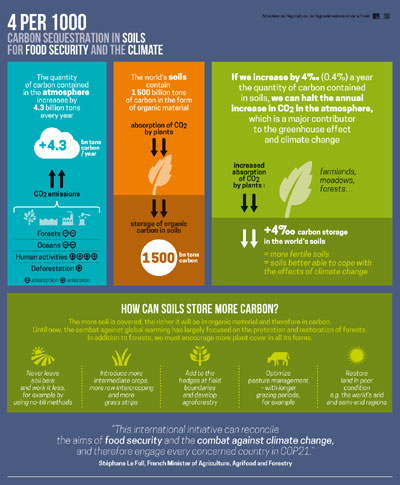While agriculture didn’t make it into the final Paris Climate Agreement, it is interwoven into many country strategies and a host of new initiatives are taking off.
4 per 1000: Soils for Food security and Climate
Amazingly, by improving the world’s soil by just 0.4% a year, it would compensate for all the emissions we send into the atmosphere, according to Jean-François Soussan, Director of the French National Institute for Agronomical Research. The initiative goes beyond agricultural soils to grasslands, grazing pastures, and forest soils. Over 100 partners have signed on.
It involves training and outreach programs to encourage sound practices; financing projects to restore soils; fostering public policies and supply chains that reverse degradation of soils.
Actions they recommend are common to organic agriculture, such as:
- Reduce the use of chemical fertilizers by best management practices – such as crop rotation, cover crops and no-till agriculture – particularly to lower nitrogen oxide emissions.
- Incorporating trees in agriculture – Agriforestry
- Restoring grasslands
- Feeding cattle their natural diet of grasses instead of grains, which cut emissions of methane and nitrogen.Tom Newmark of the Carbon Underground explains the basic concept of Regeneration:
"There is a technology that exists today that will suck excess CO2 out of the atmosphere. That technology is called photosynthesis," says Tom Newmark at Carbon Underground. "More carbon is currently sequestered in the living soils of the planet (2,700 billion tons) than there is in the entire atmosphere and biotic community combined (plants and trees)." Industrial agriculture, he says, rips carbon out of the soil, letting it escape into the atmosphere.
The great news is that in just 10 years, we could return to 350 ppm, says Newmark.

US Initiatives
Cap-and-trade is taking off in US agriculture, rewarding farmers and ranchers for better management practices. Initial programs are for rice growers and grasslands, followed by a program to reduce the use of fertilizers. It’s even got a new name, Carbon Farming.
SUSTAIN trains agricultural retailers in best practices for sustainable farming and aims to enroll 10 million acres in the program by 2020. So far, over 300 sales representatives from companies like Campbell’s, Unilever and Kellogg have been trained on sourcing sustainably.
Read our article, California Ranchers Enticed Into Carbon Farming.
Check out the website, Regeneration International:
